Evaluation of Current Health Practices in New Zealand Report 2022
VerifiedAdded on 2022/10/13
|14
|3367
|32
AI Summary
Contribute Materials
Your contribution can guide someone’s learning journey. Share your
documents today.
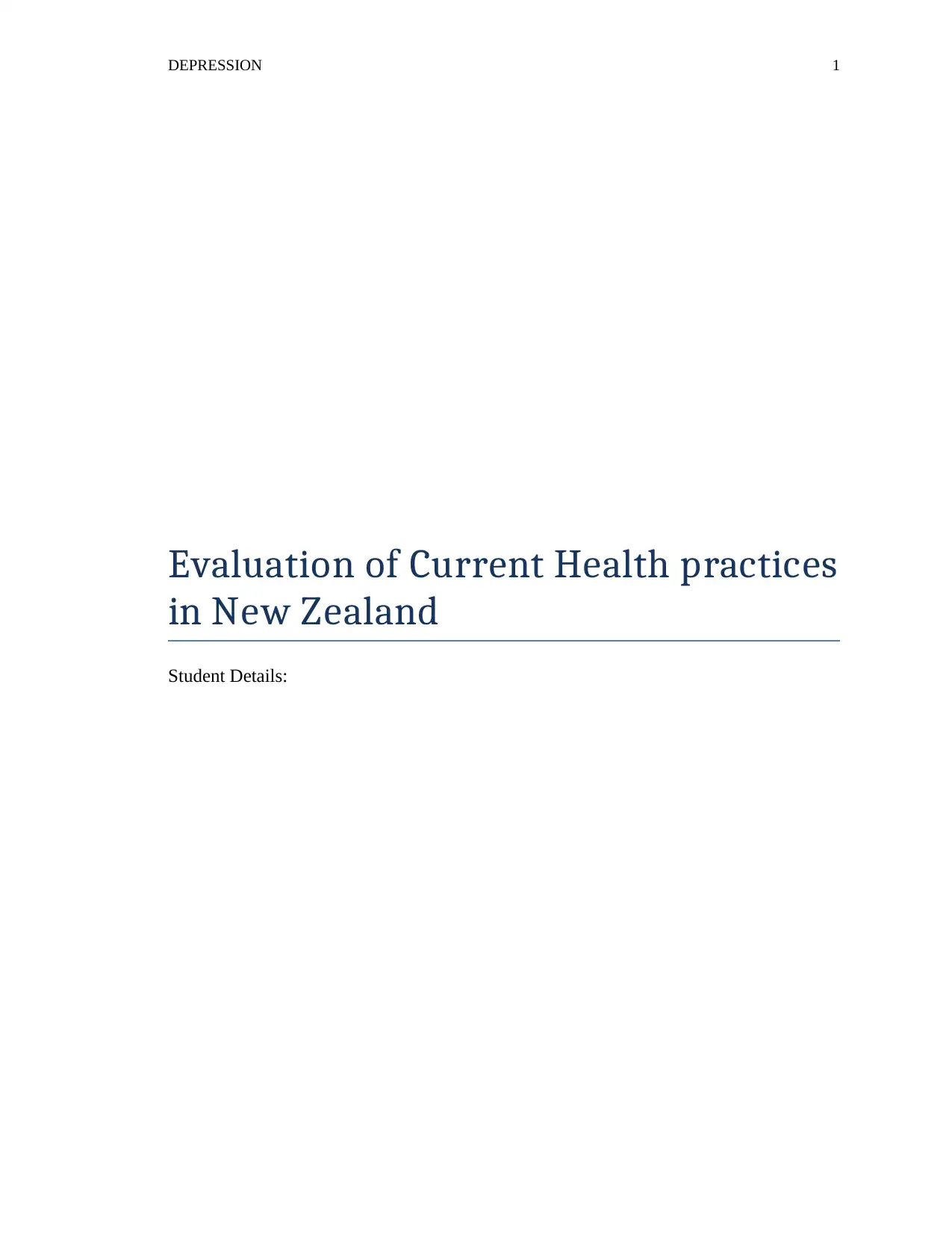
DEPRESSION 1
Evaluation of Current Health practices
in New Zealand
Student Details:
Evaluation of Current Health practices
in New Zealand
Student Details:
Secure Best Marks with AI Grader
Need help grading? Try our AI Grader for instant feedback on your assignments.
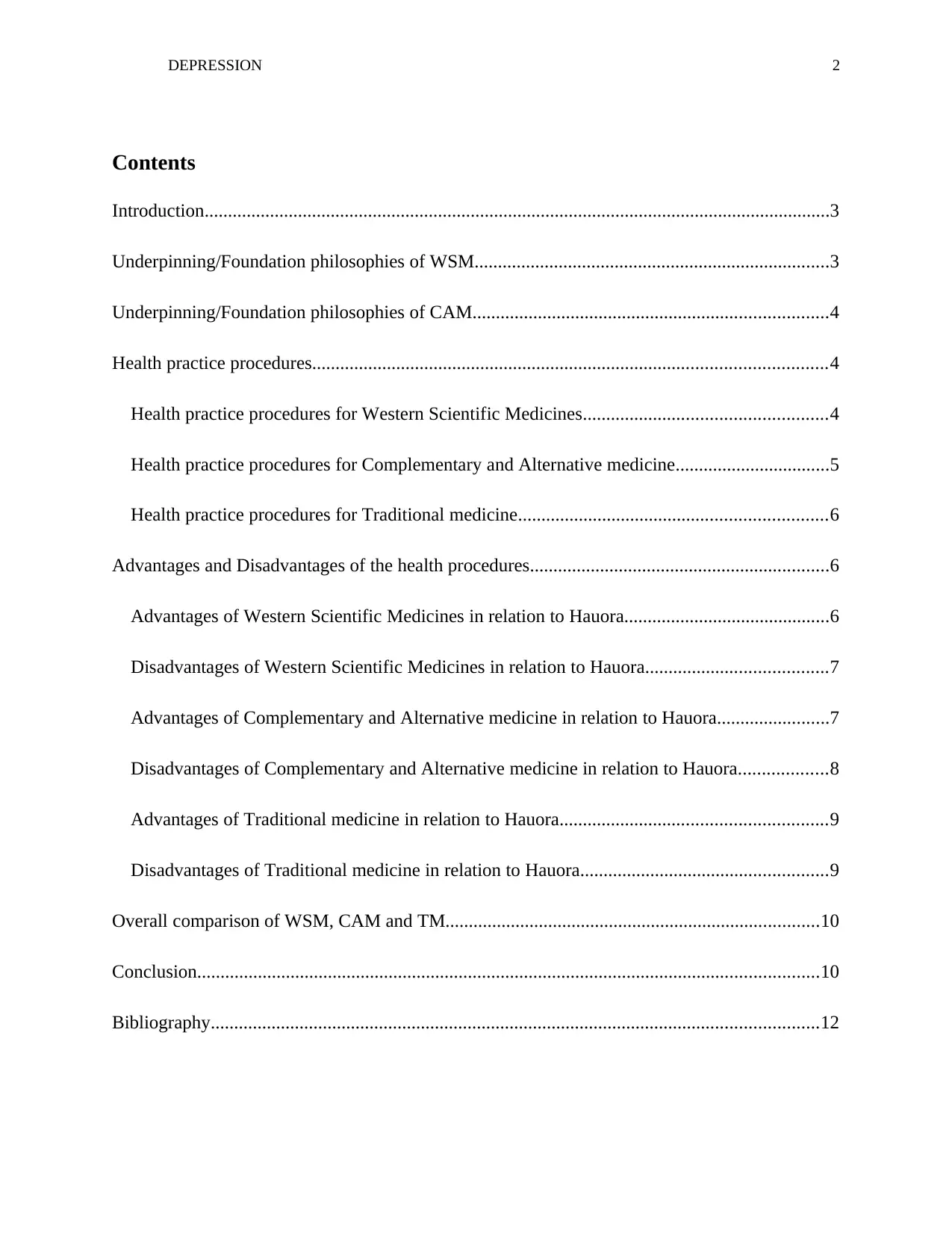
DEPRESSION 2
Contents
Introduction......................................................................................................................................3
Underpinning/Foundation philosophies of WSM............................................................................3
Underpinning/Foundation philosophies of CAM............................................................................4
Health practice procedures..............................................................................................................4
Health practice procedures for Western Scientific Medicines....................................................4
Health practice procedures for Complementary and Alternative medicine.................................5
Health practice procedures for Traditional medicine..................................................................6
Advantages and Disadvantages of the health procedures................................................................6
Advantages of Western Scientific Medicines in relation to Hauora............................................6
Disadvantages of Western Scientific Medicines in relation to Hauora.......................................7
Advantages of Complementary and Alternative medicine in relation to Hauora........................7
Disadvantages of Complementary and Alternative medicine in relation to Hauora...................8
Advantages of Traditional medicine in relation to Hauora.........................................................9
Disadvantages of Traditional medicine in relation to Hauora.....................................................9
Overall comparison of WSM, CAM and TM................................................................................10
Conclusion.....................................................................................................................................10
Bibliography..................................................................................................................................12
Contents
Introduction......................................................................................................................................3
Underpinning/Foundation philosophies of WSM............................................................................3
Underpinning/Foundation philosophies of CAM............................................................................4
Health practice procedures..............................................................................................................4
Health practice procedures for Western Scientific Medicines....................................................4
Health practice procedures for Complementary and Alternative medicine.................................5
Health practice procedures for Traditional medicine..................................................................6
Advantages and Disadvantages of the health procedures................................................................6
Advantages of Western Scientific Medicines in relation to Hauora............................................6
Disadvantages of Western Scientific Medicines in relation to Hauora.......................................7
Advantages of Complementary and Alternative medicine in relation to Hauora........................7
Disadvantages of Complementary and Alternative medicine in relation to Hauora...................8
Advantages of Traditional medicine in relation to Hauora.........................................................9
Disadvantages of Traditional medicine in relation to Hauora.....................................................9
Overall comparison of WSM, CAM and TM................................................................................10
Conclusion.....................................................................................................................................10
Bibliography..................................................................................................................................12
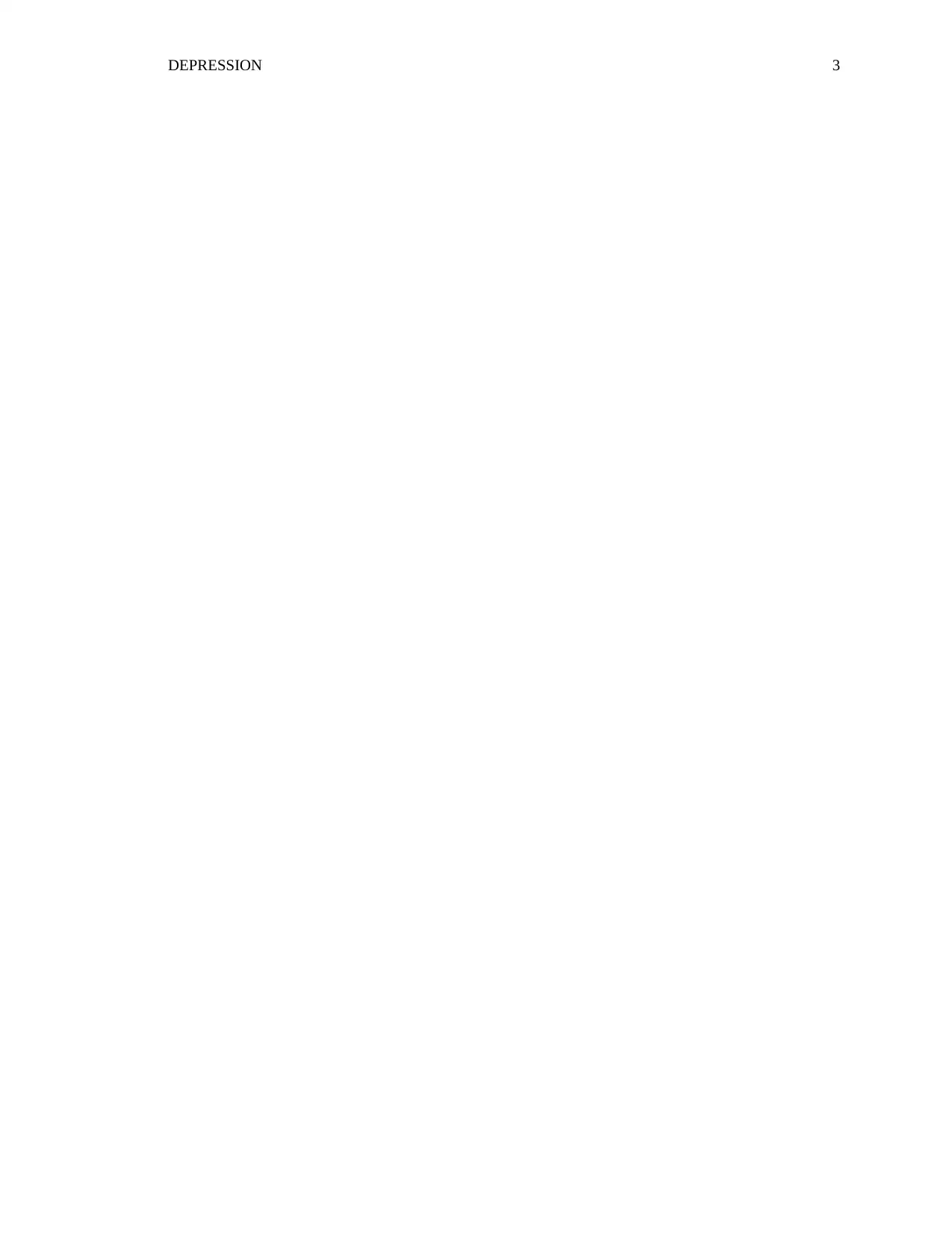
DEPRESSION 3
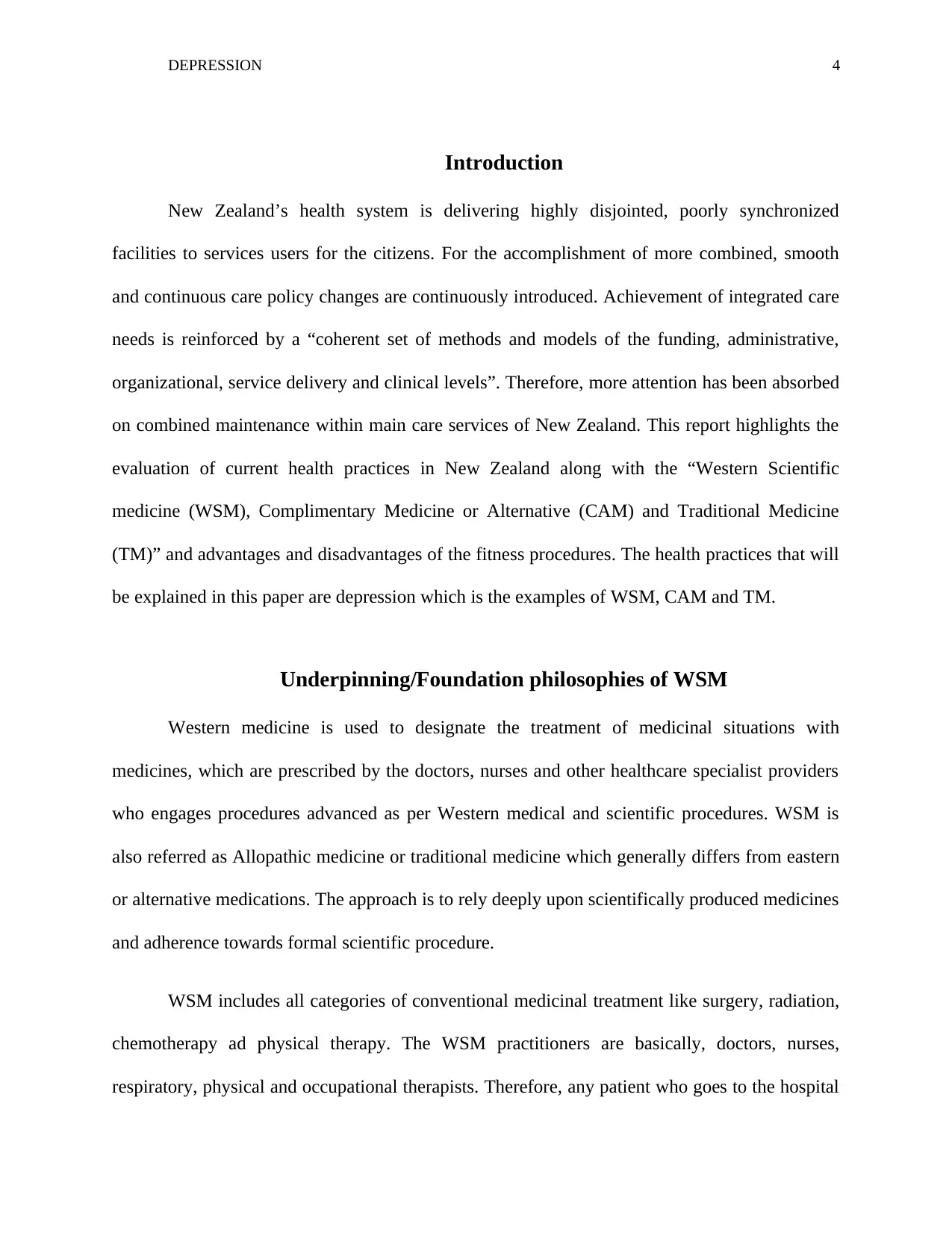
DEPRESSION 4
Introduction
New Zealand’s health system is delivering highly disjointed, poorly synchronized
facilities to services users for the citizens. For the accomplishment of more combined, smooth
and continuous care policy changes are continuously introduced. Achievement of integrated care
needs is reinforced by a “coherent set of methods and models of the funding, administrative,
organizational, service delivery and clinical levels”. Therefore, more attention has been absorbed
on combined maintenance within main care services of New Zealand. This report highlights the
evaluation of current health practices in New Zealand along with the “Western Scientific
medicine (WSM), Complimentary Medicine or Alternative (CAM) and Traditional Medicine
(TM)” and advantages and disadvantages of the fitness procedures. The health practices that will
be explained in this paper are depression which is the examples of WSM, CAM and TM.
Underpinning/Foundation philosophies of WSM
Western medicine is used to designate the treatment of medicinal situations with
medicines, which are prescribed by the doctors, nurses and other healthcare specialist providers
who engages procedures advanced as per Western medical and scientific procedures. WSM is
also referred as Allopathic medicine or traditional medicine which generally differs from eastern
or alternative medications. The approach is to rely deeply upon scientifically produced medicines
and adherence towards formal scientific procedure.
WSM includes all categories of conventional medicinal treatment like surgery, radiation,
chemotherapy ad physical therapy. The WSM practitioners are basically, doctors, nurses,
respiratory, physical and occupational therapists. Therefore, any patient who goes to the hospital
Introduction
New Zealand’s health system is delivering highly disjointed, poorly synchronized
facilities to services users for the citizens. For the accomplishment of more combined, smooth
and continuous care policy changes are continuously introduced. Achievement of integrated care
needs is reinforced by a “coherent set of methods and models of the funding, administrative,
organizational, service delivery and clinical levels”. Therefore, more attention has been absorbed
on combined maintenance within main care services of New Zealand. This report highlights the
evaluation of current health practices in New Zealand along with the “Western Scientific
medicine (WSM), Complimentary Medicine or Alternative (CAM) and Traditional Medicine
(TM)” and advantages and disadvantages of the fitness procedures. The health practices that will
be explained in this paper are depression which is the examples of WSM, CAM and TM.
Underpinning/Foundation philosophies of WSM
Western medicine is used to designate the treatment of medicinal situations with
medicines, which are prescribed by the doctors, nurses and other healthcare specialist providers
who engages procedures advanced as per Western medical and scientific procedures. WSM is
also referred as Allopathic medicine or traditional medicine which generally differs from eastern
or alternative medications. The approach is to rely deeply upon scientifically produced medicines
and adherence towards formal scientific procedure.
WSM includes all categories of conventional medicinal treatment like surgery, radiation,
chemotherapy ad physical therapy. The WSM practitioners are basically, doctors, nurses,
respiratory, physical and occupational therapists. Therefore, any patient who goes to the hospital
Secure Best Marks with AI Grader
Need help grading? Try our AI Grader for instant feedback on your assignments.
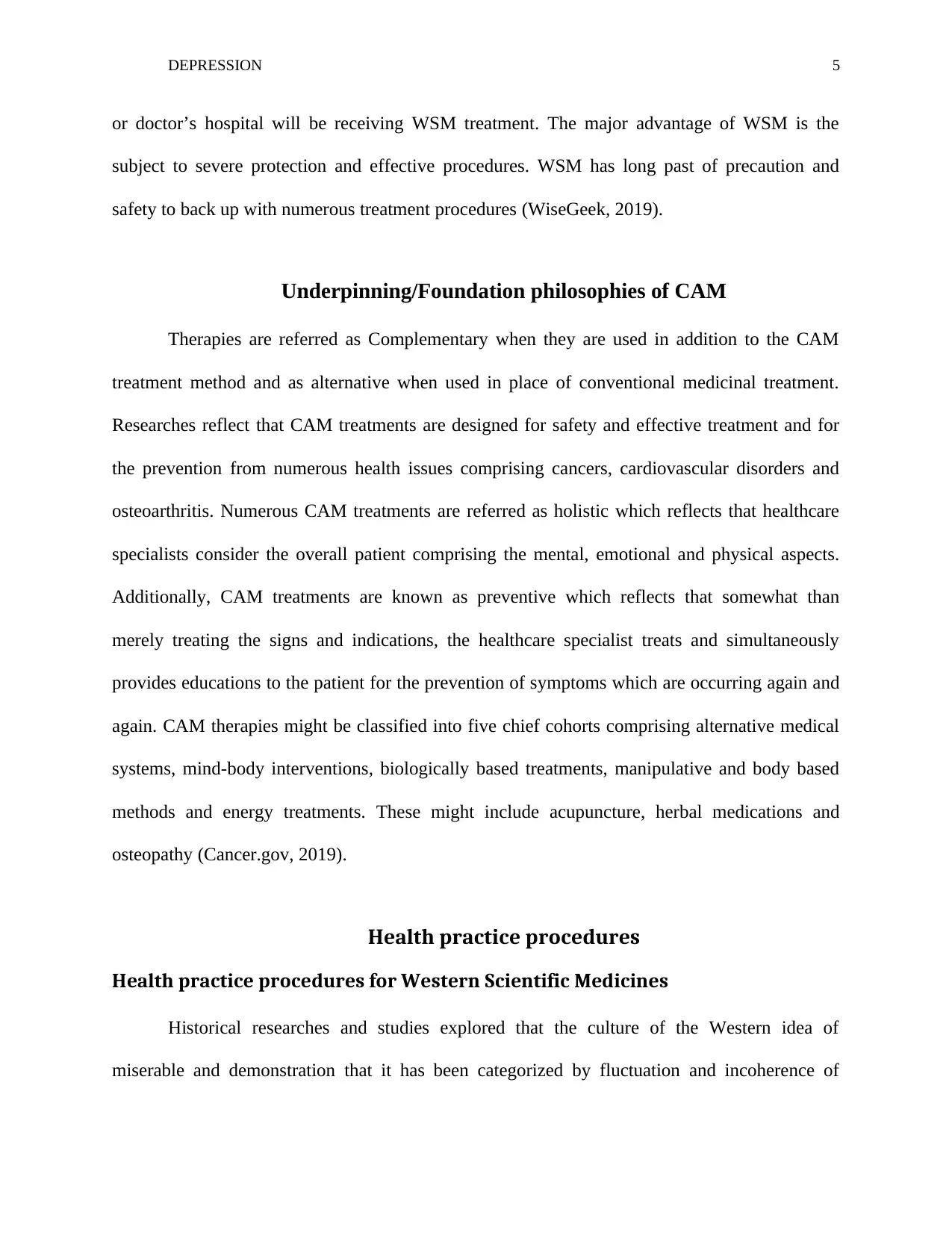
DEPRESSION 5
or doctor’s hospital will be receiving WSM treatment. The major advantage of WSM is the
subject to severe protection and effective procedures. WSM has long past of precaution and
safety to back up with numerous treatment procedures (WiseGeek, 2019).
Underpinning/Foundation philosophies of CAM
Therapies are referred as Complementary when they are used in addition to the CAM
treatment method and as alternative when used in place of conventional medicinal treatment.
Researches reflect that CAM treatments are designed for safety and effective treatment and for
the prevention from numerous health issues comprising cancers, cardiovascular disorders and
osteoarthritis. Numerous CAM treatments are referred as holistic which reflects that healthcare
specialists consider the overall patient comprising the mental, emotional and physical aspects.
Additionally, CAM treatments are known as preventive which reflects that somewhat than
merely treating the signs and indications, the healthcare specialist treats and simultaneously
provides educations to the patient for the prevention of symptoms which are occurring again and
again. CAM therapies might be classified into five chief cohorts comprising alternative medical
systems, mind-body interventions, biologically based treatments, manipulative and body based
methods and energy treatments. These might include acupuncture, herbal medications and
osteopathy (Cancer.gov, 2019).
Health practice procedures
Health practice procedures for Western Scientific Medicines
Historical researches and studies explored that the culture of the Western idea of
miserable and demonstration that it has been categorized by fluctuation and incoherence of
or doctor’s hospital will be receiving WSM treatment. The major advantage of WSM is the
subject to severe protection and effective procedures. WSM has long past of precaution and
safety to back up with numerous treatment procedures (WiseGeek, 2019).
Underpinning/Foundation philosophies of CAM
Therapies are referred as Complementary when they are used in addition to the CAM
treatment method and as alternative when used in place of conventional medicinal treatment.
Researches reflect that CAM treatments are designed for safety and effective treatment and for
the prevention from numerous health issues comprising cancers, cardiovascular disorders and
osteoarthritis. Numerous CAM treatments are referred as holistic which reflects that healthcare
specialists consider the overall patient comprising the mental, emotional and physical aspects.
Additionally, CAM treatments are known as preventive which reflects that somewhat than
merely treating the signs and indications, the healthcare specialist treats and simultaneously
provides educations to the patient for the prevention of symptoms which are occurring again and
again. CAM therapies might be classified into five chief cohorts comprising alternative medical
systems, mind-body interventions, biologically based treatments, manipulative and body based
methods and energy treatments. These might include acupuncture, herbal medications and
osteopathy (Cancer.gov, 2019).
Health practice procedures
Health practice procedures for Western Scientific Medicines
Historical researches and studies explored that the culture of the Western idea of
miserable and demonstration that it has been categorized by fluctuation and incoherence of
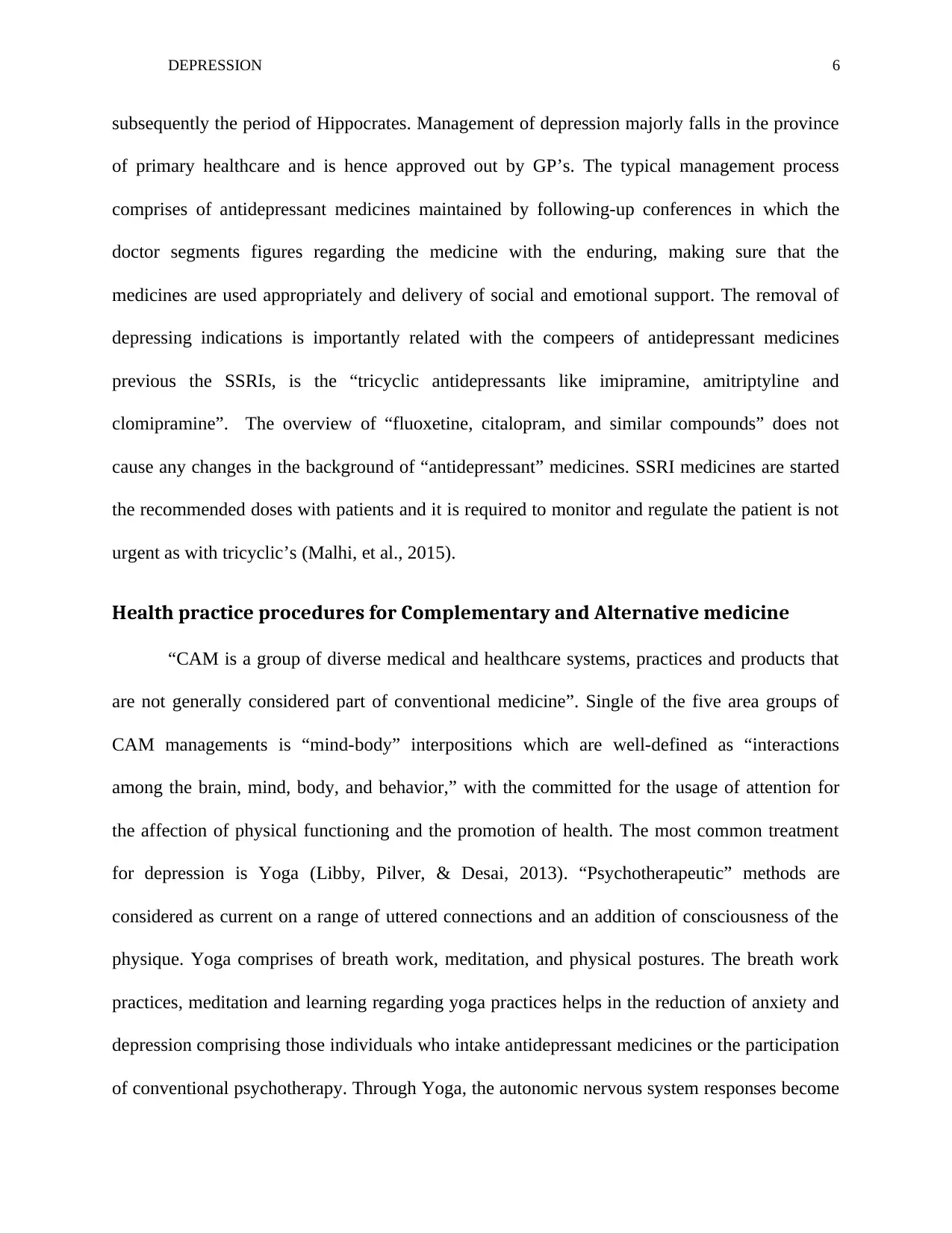
DEPRESSION 6
subsequently the period of Hippocrates. Management of depression majorly falls in the province
of primary healthcare and is hence approved out by GP’s. The typical management process
comprises of antidepressant medicines maintained by following-up conferences in which the
doctor segments figures regarding the medicine with the enduring, making sure that the
medicines are used appropriately and delivery of social and emotional support. The removal of
depressing indications is importantly related with the compeers of antidepressant medicines
previous the SSRIs, is the “tricyclic antidepressants like imipramine, amitriptyline and
clomipramine”. The overview of “fluoxetine, citalopram, and similar compounds” does not
cause any changes in the background of “antidepressant” medicines. SSRI medicines are started
the recommended doses with patients and it is required to monitor and regulate the patient is not
urgent as with tricyclic’s (Malhi, et al., 2015).
Health practice procedures for Complementary and Alternative medicine
“CAM is a group of diverse medical and healthcare systems, practices and products that
are not generally considered part of conventional medicine”. Single of the five area groups of
CAM managements is “mind-body” interpositions which are well-defined as “interactions
among the brain, mind, body, and behavior,” with the committed for the usage of attention for
the affection of physical functioning and the promotion of health. The most common treatment
for depression is Yoga (Libby, Pilver, & Desai, 2013). “Psychotherapeutic” methods are
considered as current on a range of uttered connections and an addition of consciousness of the
physique. Yoga comprises of breath work, meditation, and physical postures. The breath work
practices, meditation and learning regarding yoga practices helps in the reduction of anxiety and
depression comprising those individuals who intake antidepressant medicines or the participation
of conventional psychotherapy. Through Yoga, the autonomic nervous system responses become
subsequently the period of Hippocrates. Management of depression majorly falls in the province
of primary healthcare and is hence approved out by GP’s. The typical management process
comprises of antidepressant medicines maintained by following-up conferences in which the
doctor segments figures regarding the medicine with the enduring, making sure that the
medicines are used appropriately and delivery of social and emotional support. The removal of
depressing indications is importantly related with the compeers of antidepressant medicines
previous the SSRIs, is the “tricyclic antidepressants like imipramine, amitriptyline and
clomipramine”. The overview of “fluoxetine, citalopram, and similar compounds” does not
cause any changes in the background of “antidepressant” medicines. SSRI medicines are started
the recommended doses with patients and it is required to monitor and regulate the patient is not
urgent as with tricyclic’s (Malhi, et al., 2015).
Health practice procedures for Complementary and Alternative medicine
“CAM is a group of diverse medical and healthcare systems, practices and products that
are not generally considered part of conventional medicine”. Single of the five area groups of
CAM managements is “mind-body” interpositions which are well-defined as “interactions
among the brain, mind, body, and behavior,” with the committed for the usage of attention for
the affection of physical functioning and the promotion of health. The most common treatment
for depression is Yoga (Libby, Pilver, & Desai, 2013). “Psychotherapeutic” methods are
considered as current on a range of uttered connections and an addition of consciousness of the
physique. Yoga comprises of breath work, meditation, and physical postures. The breath work
practices, meditation and learning regarding yoga practices helps in the reduction of anxiety and
depression comprising those individuals who intake antidepressant medicines or the participation
of conventional psychotherapy. Through Yoga, the autonomic nervous system responses become
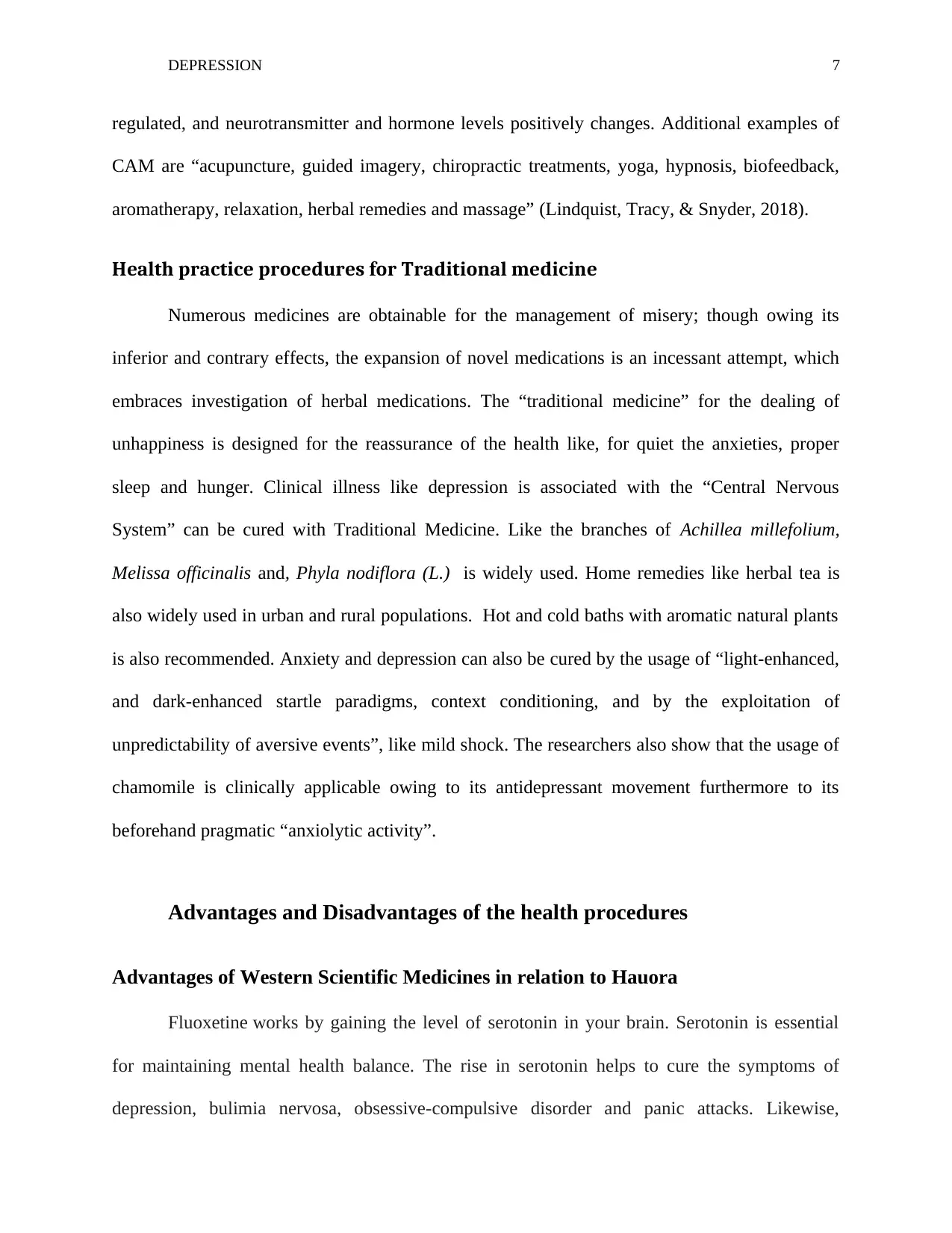
DEPRESSION 7
regulated, and neurotransmitter and hormone levels positively changes. Additional examples of
CAM are “acupuncture, guided imagery, chiropractic treatments, yoga, hypnosis, biofeedback,
aromatherapy, relaxation, herbal remedies and massage” (Lindquist, Tracy, & Snyder, 2018).
Health practice procedures for Traditional medicine
Numerous medicines are obtainable for the management of misery; though owing its
inferior and contrary effects, the expansion of novel medications is an incessant attempt, which
embraces investigation of herbal medications. The “traditional medicine” for the dealing of
unhappiness is designed for the reassurance of the health like, for quiet the anxieties, proper
sleep and hunger. Clinical illness like depression is associated with the “Central Nervous
System” can be cured with Traditional Medicine. Like the branches of Achillea millefolium,
Melissa officinalis and, Phyla nodiflora (L.) is widely used. Home remedies like herbal tea is
also widely used in urban and rural populations. Hot and cold baths with aromatic natural plants
is also recommended. Anxiety and depression can also be cured by the usage of “light-enhanced,
and dark-enhanced startle paradigms, context conditioning, and by the exploitation of
unpredictability of aversive events”, like mild shock. The researchers also show that the usage of
chamomile is clinically applicable owing to its antidepressant movement furthermore to its
beforehand pragmatic “anxiolytic activity”.
Advantages and Disadvantages of the health procedures
Advantages of Western Scientific Medicines in relation to Hauora
Fluoxetine works by gaining the level of serotonin in your brain. Serotonin is essential
for maintaining mental health balance. The rise in serotonin helps to cure the symptoms of
depression, bulimia nervosa, obsessive-compulsive disorder and panic attacks. Likewise,
regulated, and neurotransmitter and hormone levels positively changes. Additional examples of
CAM are “acupuncture, guided imagery, chiropractic treatments, yoga, hypnosis, biofeedback,
aromatherapy, relaxation, herbal remedies and massage” (Lindquist, Tracy, & Snyder, 2018).
Health practice procedures for Traditional medicine
Numerous medicines are obtainable for the management of misery; though owing its
inferior and contrary effects, the expansion of novel medications is an incessant attempt, which
embraces investigation of herbal medications. The “traditional medicine” for the dealing of
unhappiness is designed for the reassurance of the health like, for quiet the anxieties, proper
sleep and hunger. Clinical illness like depression is associated with the “Central Nervous
System” can be cured with Traditional Medicine. Like the branches of Achillea millefolium,
Melissa officinalis and, Phyla nodiflora (L.) is widely used. Home remedies like herbal tea is
also widely used in urban and rural populations. Hot and cold baths with aromatic natural plants
is also recommended. Anxiety and depression can also be cured by the usage of “light-enhanced,
and dark-enhanced startle paradigms, context conditioning, and by the exploitation of
unpredictability of aversive events”, like mild shock. The researchers also show that the usage of
chamomile is clinically applicable owing to its antidepressant movement furthermore to its
beforehand pragmatic “anxiolytic activity”.
Advantages and Disadvantages of the health procedures
Advantages of Western Scientific Medicines in relation to Hauora
Fluoxetine works by gaining the level of serotonin in your brain. Serotonin is essential
for maintaining mental health balance. The rise in serotonin helps to cure the symptoms of
depression, bulimia nervosa, obsessive-compulsive disorder and panic attacks. Likewise,
Paraphrase This Document
Need a fresh take? Get an instant paraphrase of this document with our AI Paraphraser
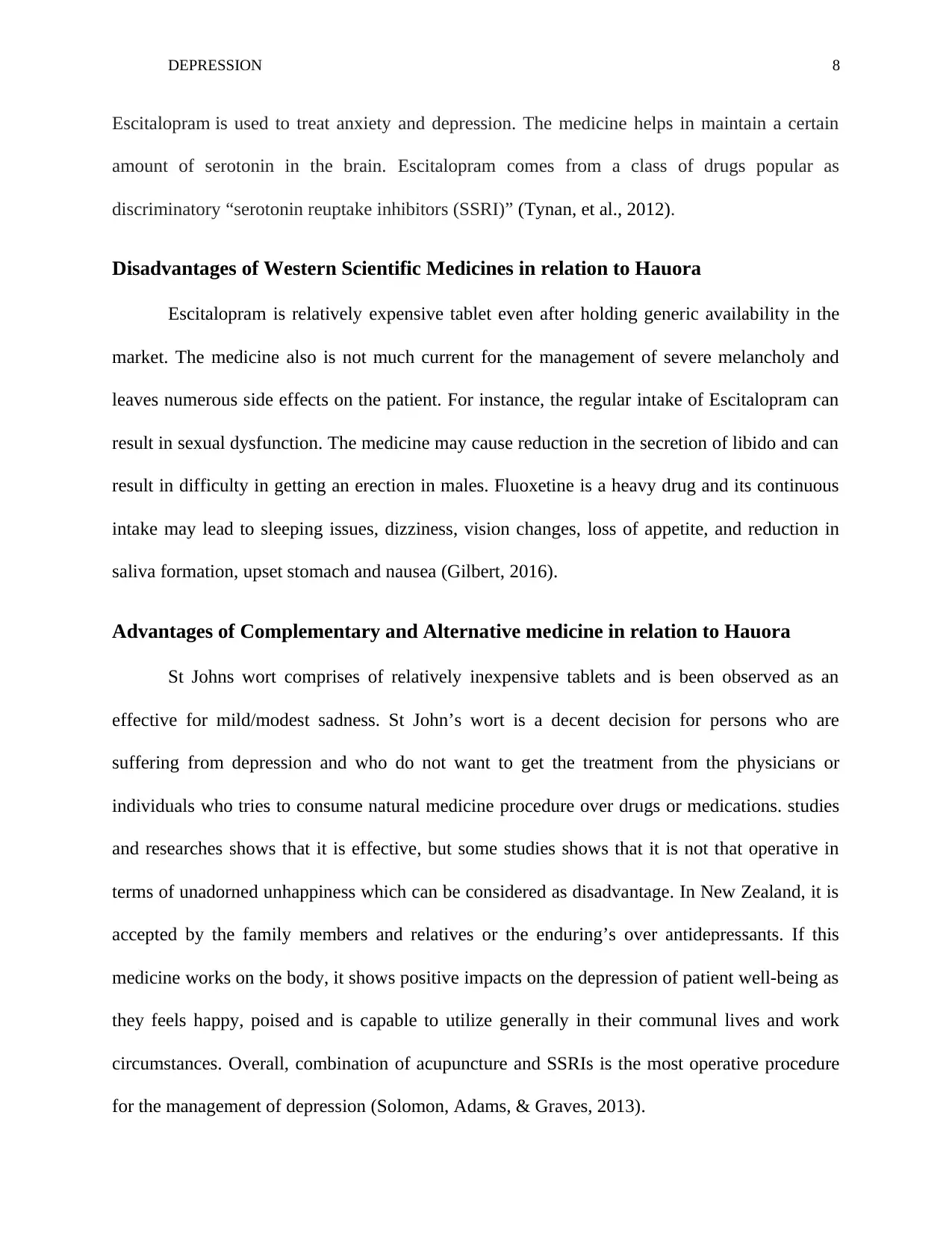
DEPRESSION 8
Escitalopram is used to treat anxiety and depression. The medicine helps in maintain a certain
amount of serotonin in the brain. Escitalopram comes from a class of drugs popular as
discriminatory “serotonin reuptake inhibitors (SSRI)” (Tynan, et al., 2012).
Disadvantages of Western Scientific Medicines in relation to Hauora
Escitalopram is relatively expensive tablet even after holding generic availability in the
market. The medicine also is not much current for the management of severe melancholy and
leaves numerous side effects on the patient. For instance, the regular intake of Escitalopram can
result in sexual dysfunction. The medicine may cause reduction in the secretion of libido and can
result in difficulty in getting an erection in males. Fluoxetine is a heavy drug and its continuous
intake may lead to sleeping issues, dizziness, vision changes, loss of appetite, and reduction in
saliva formation, upset stomach and nausea (Gilbert, 2016).
Advantages of Complementary and Alternative medicine in relation to Hauora
St Johns wort comprises of relatively inexpensive tablets and is been observed as an
effective for mild/modest sadness. St John’s wort is a decent decision for persons who are
suffering from depression and who do not want to get the treatment from the physicians or
individuals who tries to consume natural medicine procedure over drugs or medications. studies
and researches shows that it is effective, but some studies shows that it is not that operative in
terms of unadorned unhappiness which can be considered as disadvantage. In New Zealand, it is
accepted by the family members and relatives or the enduring’s over antidepressants. If this
medicine works on the body, it shows positive impacts on the depression of patient well-being as
they feels happy, poised and is capable to utilize generally in their communal lives and work
circumstances. Overall, combination of acupuncture and SSRIs is the most operative procedure
for the management of depression (Solomon, Adams, & Graves, 2013).
Escitalopram is used to treat anxiety and depression. The medicine helps in maintain a certain
amount of serotonin in the brain. Escitalopram comes from a class of drugs popular as
discriminatory “serotonin reuptake inhibitors (SSRI)” (Tynan, et al., 2012).
Disadvantages of Western Scientific Medicines in relation to Hauora
Escitalopram is relatively expensive tablet even after holding generic availability in the
market. The medicine also is not much current for the management of severe melancholy and
leaves numerous side effects on the patient. For instance, the regular intake of Escitalopram can
result in sexual dysfunction. The medicine may cause reduction in the secretion of libido and can
result in difficulty in getting an erection in males. Fluoxetine is a heavy drug and its continuous
intake may lead to sleeping issues, dizziness, vision changes, loss of appetite, and reduction in
saliva formation, upset stomach and nausea (Gilbert, 2016).
Advantages of Complementary and Alternative medicine in relation to Hauora
St Johns wort comprises of relatively inexpensive tablets and is been observed as an
effective for mild/modest sadness. St John’s wort is a decent decision for persons who are
suffering from depression and who do not want to get the treatment from the physicians or
individuals who tries to consume natural medicine procedure over drugs or medications. studies
and researches shows that it is effective, but some studies shows that it is not that operative in
terms of unadorned unhappiness which can be considered as disadvantage. In New Zealand, it is
accepted by the family members and relatives or the enduring’s over antidepressants. If this
medicine works on the body, it shows positive impacts on the depression of patient well-being as
they feels happy, poised and is capable to utilize generally in their communal lives and work
circumstances. Overall, combination of acupuncture and SSRIs is the most operative procedure
for the management of depression (Solomon, Adams, & Graves, 2013).
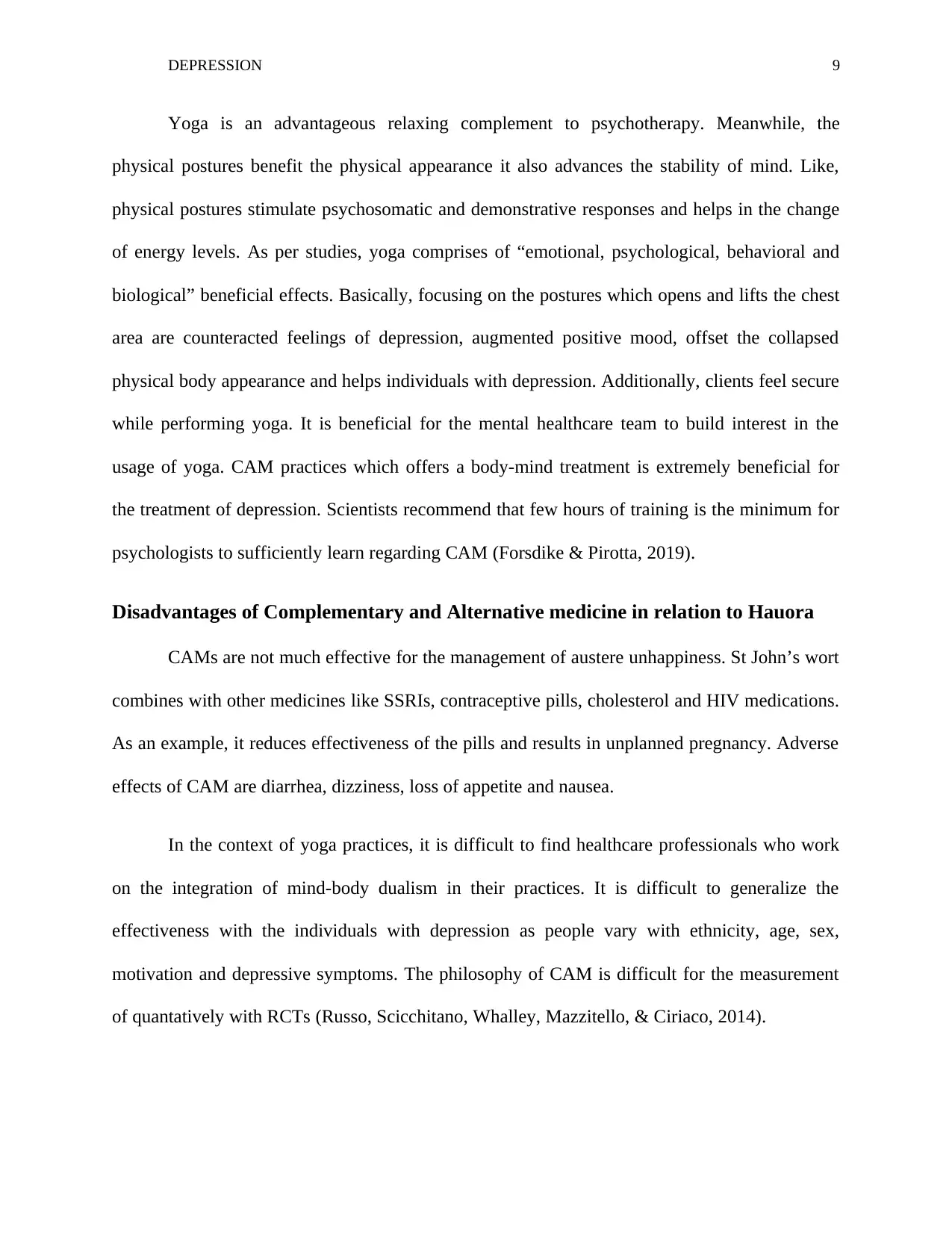
DEPRESSION 9
Yoga is an advantageous relaxing complement to psychotherapy. Meanwhile, the
physical postures benefit the physical appearance it also advances the stability of mind. Like,
physical postures stimulate psychosomatic and demonstrative responses and helps in the change
of energy levels. As per studies, yoga comprises of “emotional, psychological, behavioral and
biological” beneficial effects. Basically, focusing on the postures which opens and lifts the chest
area are counteracted feelings of depression, augmented positive mood, offset the collapsed
physical body appearance and helps individuals with depression. Additionally, clients feel secure
while performing yoga. It is beneficial for the mental healthcare team to build interest in the
usage of yoga. CAM practices which offers a body-mind treatment is extremely beneficial for
the treatment of depression. Scientists recommend that few hours of training is the minimum for
psychologists to sufficiently learn regarding CAM (Forsdike & Pirotta, 2019).
Disadvantages of Complementary and Alternative medicine in relation to Hauora
CAMs are not much effective for the management of austere unhappiness. St John’s wort
combines with other medicines like SSRIs, contraceptive pills, cholesterol and HIV medications.
As an example, it reduces effectiveness of the pills and results in unplanned pregnancy. Adverse
effects of CAM are diarrhea, dizziness, loss of appetite and nausea.
In the context of yoga practices, it is difficult to find healthcare professionals who work
on the integration of mind-body dualism in their practices. It is difficult to generalize the
effectiveness with the individuals with depression as people vary with ethnicity, age, sex,
motivation and depressive symptoms. The philosophy of CAM is difficult for the measurement
of quantatively with RCTs (Russo, Scicchitano, Whalley, Mazzitello, & Ciriaco, 2014).
Yoga is an advantageous relaxing complement to psychotherapy. Meanwhile, the
physical postures benefit the physical appearance it also advances the stability of mind. Like,
physical postures stimulate psychosomatic and demonstrative responses and helps in the change
of energy levels. As per studies, yoga comprises of “emotional, psychological, behavioral and
biological” beneficial effects. Basically, focusing on the postures which opens and lifts the chest
area are counteracted feelings of depression, augmented positive mood, offset the collapsed
physical body appearance and helps individuals with depression. Additionally, clients feel secure
while performing yoga. It is beneficial for the mental healthcare team to build interest in the
usage of yoga. CAM practices which offers a body-mind treatment is extremely beneficial for
the treatment of depression. Scientists recommend that few hours of training is the minimum for
psychologists to sufficiently learn regarding CAM (Forsdike & Pirotta, 2019).
Disadvantages of Complementary and Alternative medicine in relation to Hauora
CAMs are not much effective for the management of austere unhappiness. St John’s wort
combines with other medicines like SSRIs, contraceptive pills, cholesterol and HIV medications.
As an example, it reduces effectiveness of the pills and results in unplanned pregnancy. Adverse
effects of CAM are diarrhea, dizziness, loss of appetite and nausea.
In the context of yoga practices, it is difficult to find healthcare professionals who work
on the integration of mind-body dualism in their practices. It is difficult to generalize the
effectiveness with the individuals with depression as people vary with ethnicity, age, sex,
motivation and depressive symptoms. The philosophy of CAM is difficult for the measurement
of quantatively with RCTs (Russo, Scicchitano, Whalley, Mazzitello, & Ciriaco, 2014).
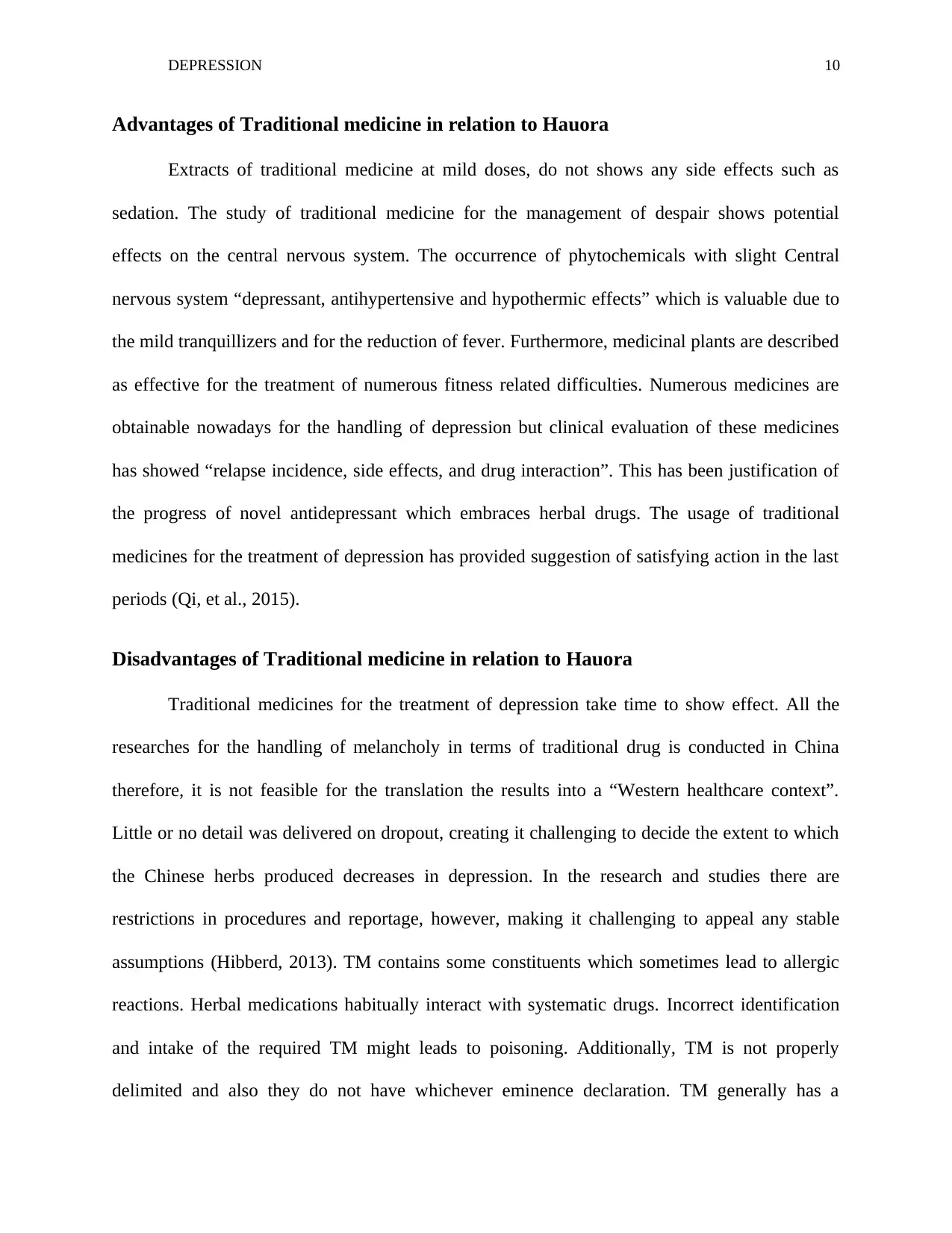
DEPRESSION 10
Advantages of Traditional medicine in relation to Hauora
Extracts of traditional medicine at mild doses, do not shows any side effects such as
sedation. The study of traditional medicine for the management of despair shows potential
effects on the central nervous system. The occurrence of phytochemicals with slight Central
nervous system “depressant, antihypertensive and hypothermic effects” which is valuable due to
the mild tranquillizers and for the reduction of fever. Furthermore, medicinal plants are described
as effective for the treatment of numerous fitness related difficulties. Numerous medicines are
obtainable nowadays for the handling of depression but clinical evaluation of these medicines
has showed “relapse incidence, side effects, and drug interaction”. This has been justification of
the progress of novel antidepressant which embraces herbal drugs. The usage of traditional
medicines for the treatment of depression has provided suggestion of satisfying action in the last
periods (Qi, et al., 2015).
Disadvantages of Traditional medicine in relation to Hauora
Traditional medicines for the treatment of depression take time to show effect. All the
researches for the handling of melancholy in terms of traditional drug is conducted in China
therefore, it is not feasible for the translation the results into a “Western healthcare context”.
Little or no detail was delivered on dropout, creating it challenging to decide the extent to which
the Chinese herbs produced decreases in depression. In the research and studies there are
restrictions in procedures and reportage, however, making it challenging to appeal any stable
assumptions (Hibberd, 2013). TM contains some constituents which sometimes lead to allergic
reactions. Herbal medications habitually interact with systematic drugs. Incorrect identification
and intake of the required TM might leads to poisoning. Additionally, TM is not properly
delimited and also they do not have whichever eminence declaration. TM generally has a
Advantages of Traditional medicine in relation to Hauora
Extracts of traditional medicine at mild doses, do not shows any side effects such as
sedation. The study of traditional medicine for the management of despair shows potential
effects on the central nervous system. The occurrence of phytochemicals with slight Central
nervous system “depressant, antihypertensive and hypothermic effects” which is valuable due to
the mild tranquillizers and for the reduction of fever. Furthermore, medicinal plants are described
as effective for the treatment of numerous fitness related difficulties. Numerous medicines are
obtainable nowadays for the handling of depression but clinical evaluation of these medicines
has showed “relapse incidence, side effects, and drug interaction”. This has been justification of
the progress of novel antidepressant which embraces herbal drugs. The usage of traditional
medicines for the treatment of depression has provided suggestion of satisfying action in the last
periods (Qi, et al., 2015).
Disadvantages of Traditional medicine in relation to Hauora
Traditional medicines for the treatment of depression take time to show effect. All the
researches for the handling of melancholy in terms of traditional drug is conducted in China
therefore, it is not feasible for the translation the results into a “Western healthcare context”.
Little or no detail was delivered on dropout, creating it challenging to decide the extent to which
the Chinese herbs produced decreases in depression. In the research and studies there are
restrictions in procedures and reportage, however, making it challenging to appeal any stable
assumptions (Hibberd, 2013). TM contains some constituents which sometimes lead to allergic
reactions. Herbal medications habitually interact with systematic drugs. Incorrect identification
and intake of the required TM might leads to poisoning. Additionally, TM is not properly
delimited and also they do not have whichever eminence declaration. TM generally has a
Secure Best Marks with AI Grader
Need help grading? Try our AI Grader for instant feedback on your assignments.
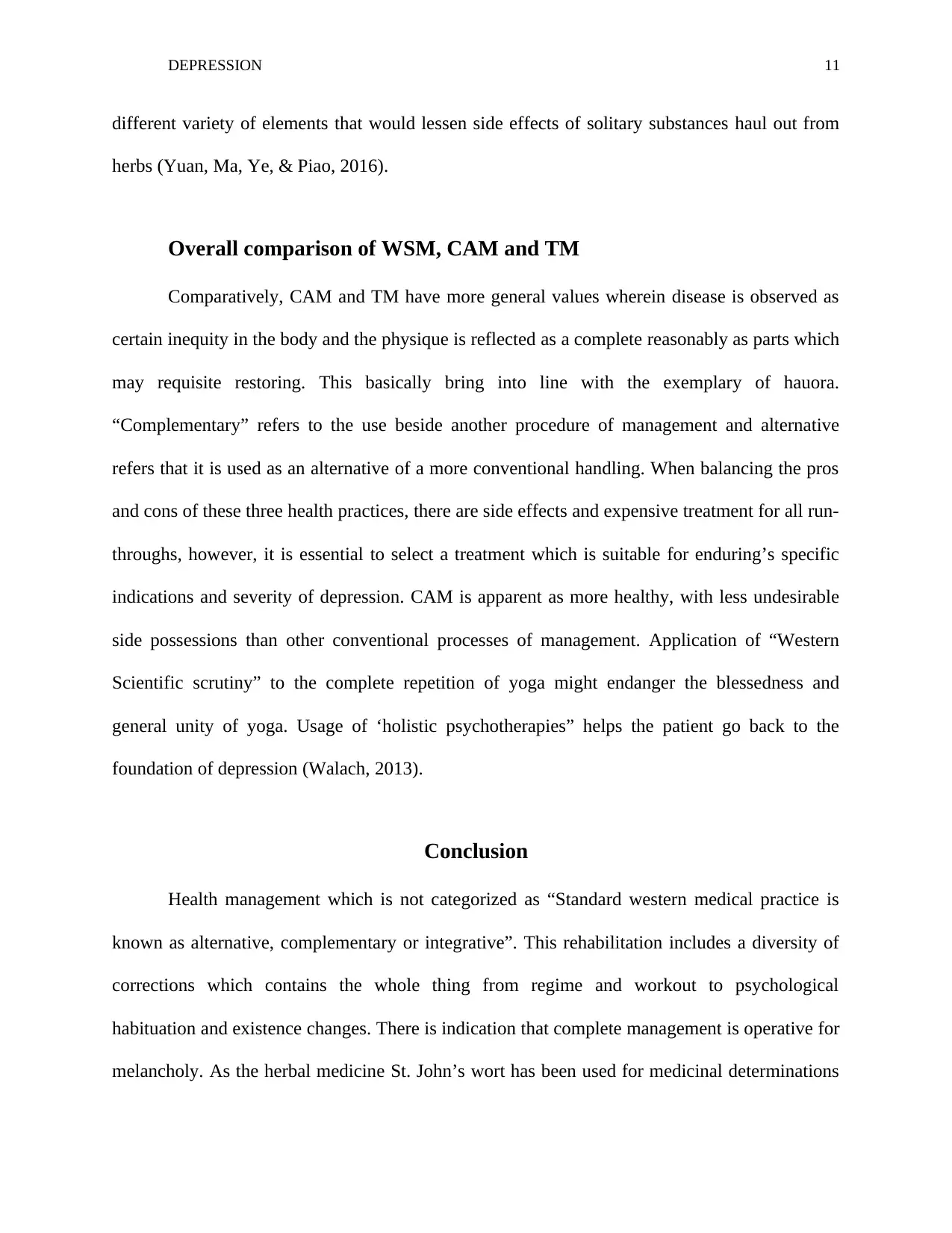
DEPRESSION 11
different variety of elements that would lessen side effects of solitary substances haul out from
herbs (Yuan, Ma, Ye, & Piao, 2016).
Overall comparison of WSM, CAM and TM
Comparatively, CAM and TM have more general values wherein disease is observed as
certain inequity in the body and the physique is reflected as a complete reasonably as parts which
may requisite restoring. This basically bring into line with the exemplary of hauora.
“Complementary” refers to the use beside another procedure of management and alternative
refers that it is used as an alternative of a more conventional handling. When balancing the pros
and cons of these three health practices, there are side effects and expensive treatment for all run-
throughs, however, it is essential to select a treatment which is suitable for enduring’s specific
indications and severity of depression. CAM is apparent as more healthy, with less undesirable
side possessions than other conventional processes of management. Application of “Western
Scientific scrutiny” to the complete repetition of yoga might endanger the blessedness and
general unity of yoga. Usage of ‘holistic psychotherapies” helps the patient go back to the
foundation of depression (Walach, 2013).
Conclusion
Health management which is not categorized as “Standard western medical practice is
known as alternative, complementary or integrative”. This rehabilitation includes a diversity of
corrections which contains the whole thing from regime and workout to psychological
habituation and existence changes. There is indication that complete management is operative for
melancholy. As the herbal medicine St. John’s wort has been used for medicinal determinations
different variety of elements that would lessen side effects of solitary substances haul out from
herbs (Yuan, Ma, Ye, & Piao, 2016).
Overall comparison of WSM, CAM and TM
Comparatively, CAM and TM have more general values wherein disease is observed as
certain inequity in the body and the physique is reflected as a complete reasonably as parts which
may requisite restoring. This basically bring into line with the exemplary of hauora.
“Complementary” refers to the use beside another procedure of management and alternative
refers that it is used as an alternative of a more conventional handling. When balancing the pros
and cons of these three health practices, there are side effects and expensive treatment for all run-
throughs, however, it is essential to select a treatment which is suitable for enduring’s specific
indications and severity of depression. CAM is apparent as more healthy, with less undesirable
side possessions than other conventional processes of management. Application of “Western
Scientific scrutiny” to the complete repetition of yoga might endanger the blessedness and
general unity of yoga. Usage of ‘holistic psychotherapies” helps the patient go back to the
foundation of depression (Walach, 2013).
Conclusion
Health management which is not categorized as “Standard western medical practice is
known as alternative, complementary or integrative”. This rehabilitation includes a diversity of
corrections which contains the whole thing from regime and workout to psychological
habituation and existence changes. There is indication that complete management is operative for
melancholy. As the herbal medicine St. John’s wort has been used for medicinal determinations
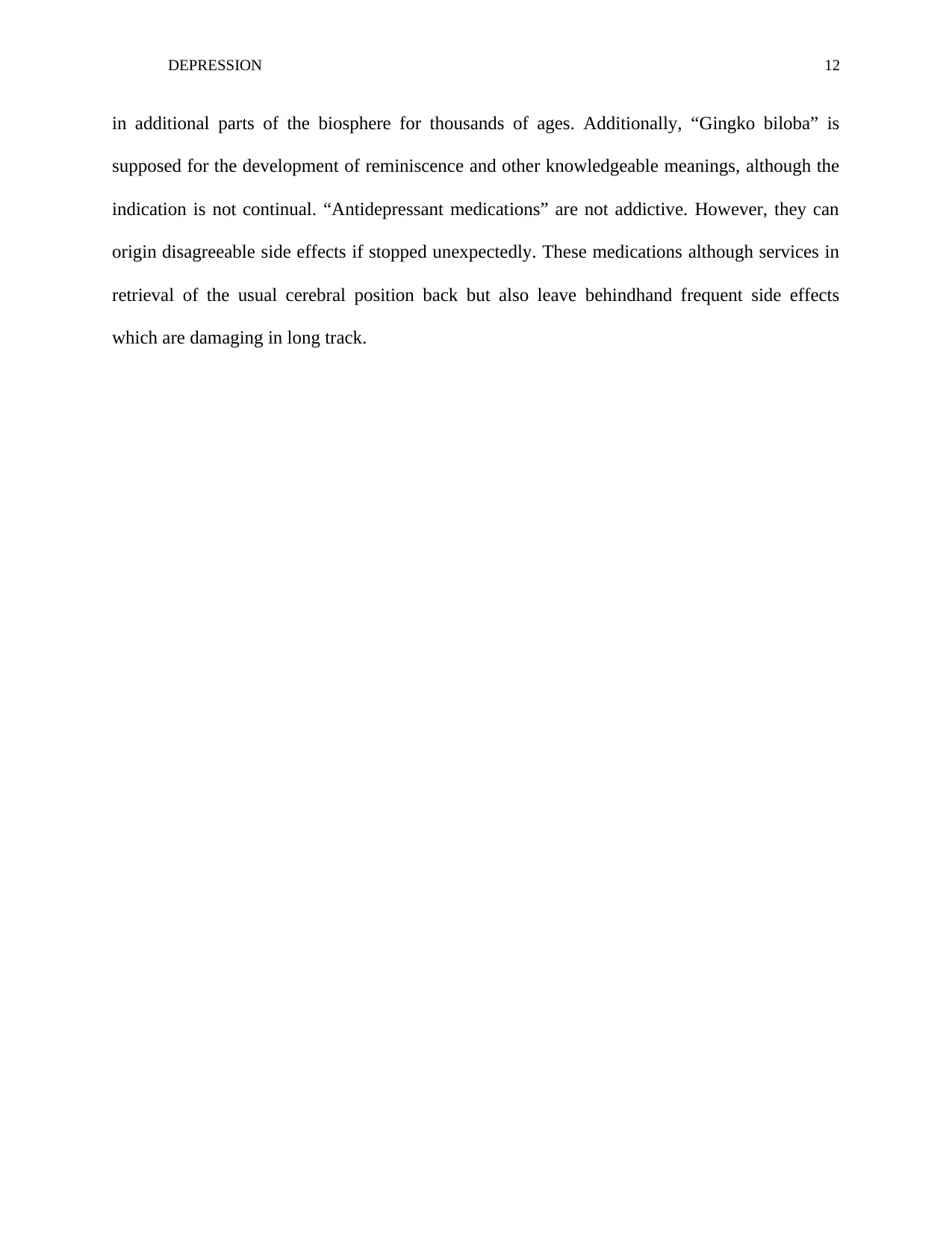
DEPRESSION 12
in additional parts of the biosphere for thousands of ages. Additionally, “Gingko biloba” is
supposed for the development of reminiscence and other knowledgeable meanings, although the
indication is not continual. “Antidepressant medications” are not addictive. However, they can
origin disagreeable side effects if stopped unexpectedly. These medications although services in
retrieval of the usual cerebral position back but also leave behindhand frequent side effects
which are damaging in long track.
in additional parts of the biosphere for thousands of ages. Additionally, “Gingko biloba” is
supposed for the development of reminiscence and other knowledgeable meanings, although the
indication is not continual. “Antidepressant medications” are not addictive. However, they can
origin disagreeable side effects if stopped unexpectedly. These medications although services in
retrieval of the usual cerebral position back but also leave behindhand frequent side effects
which are damaging in long track.
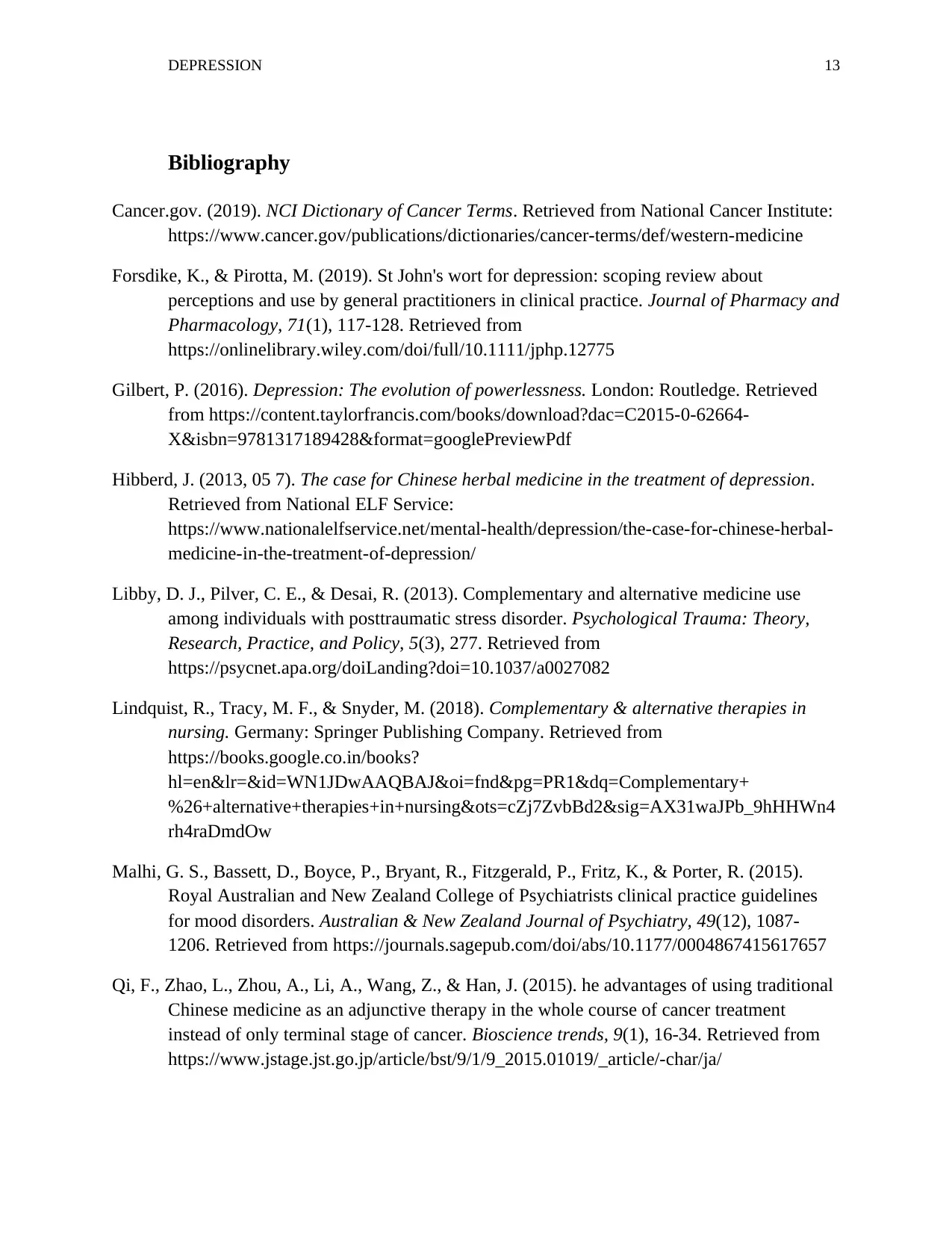
DEPRESSION 13
Bibliography
Cancer.gov. (2019). NCI Dictionary of Cancer Terms. Retrieved from National Cancer Institute:
https://www.cancer.gov/publications/dictionaries/cancer-terms/def/western-medicine
Forsdike, K., & Pirotta, M. (2019). St John's wort for depression: scoping review about
perceptions and use by general practitioners in clinical practice. Journal of Pharmacy and
Pharmacology, 71(1), 117-128. Retrieved from
https://onlinelibrary.wiley.com/doi/full/10.1111/jphp.12775
Gilbert, P. (2016). Depression: The evolution of powerlessness. London: Routledge. Retrieved
from https://content.taylorfrancis.com/books/download?dac=C2015-0-62664-
X&isbn=9781317189428&format=googlePreviewPdf
Hibberd, J. (2013, 05 7). The case for Chinese herbal medicine in the treatment of depression.
Retrieved from National ELF Service:
https://www.nationalelfservice.net/mental-health/depression/the-case-for-chinese-herbal-
medicine-in-the-treatment-of-depression/
Libby, D. J., Pilver, C. E., & Desai, R. (2013). Complementary and alternative medicine use
among individuals with posttraumatic stress disorder. Psychological Trauma: Theory,
Research, Practice, and Policy, 5(3), 277. Retrieved from
https://psycnet.apa.org/doiLanding?doi=10.1037/a0027082
Lindquist, R., Tracy, M. F., & Snyder, M. (2018). Complementary & alternative therapies in
nursing. Germany: Springer Publishing Company. Retrieved from
https://books.google.co.in/books?
hl=en&lr=&id=WN1JDwAAQBAJ&oi=fnd&pg=PR1&dq=Complementary+
%26+alternative+therapies+in+nursing&ots=cZj7ZvbBd2&sig=AX31waJPb_9hHHWn4
rh4raDmdOw
Malhi, G. S., Bassett, D., Boyce, P., Bryant, R., Fitzgerald, P., Fritz, K., & Porter, R. (2015).
Royal Australian and New Zealand College of Psychiatrists clinical practice guidelines
for mood disorders. Australian & New Zealand Journal of Psychiatry, 49(12), 1087-
1206. Retrieved from https://journals.sagepub.com/doi/abs/10.1177/0004867415617657
Qi, F., Zhao, L., Zhou, A., Li, A., Wang, Z., & Han, J. (2015). he advantages of using traditional
Chinese medicine as an adjunctive therapy in the whole course of cancer treatment
instead of only terminal stage of cancer. Bioscience trends, 9(1), 16-34. Retrieved from
https://www.jstage.jst.go.jp/article/bst/9/1/9_2015.01019/_article/-char/ja/
Bibliography
Cancer.gov. (2019). NCI Dictionary of Cancer Terms. Retrieved from National Cancer Institute:
https://www.cancer.gov/publications/dictionaries/cancer-terms/def/western-medicine
Forsdike, K., & Pirotta, M. (2019). St John's wort for depression: scoping review about
perceptions and use by general practitioners in clinical practice. Journal of Pharmacy and
Pharmacology, 71(1), 117-128. Retrieved from
https://onlinelibrary.wiley.com/doi/full/10.1111/jphp.12775
Gilbert, P. (2016). Depression: The evolution of powerlessness. London: Routledge. Retrieved
from https://content.taylorfrancis.com/books/download?dac=C2015-0-62664-
X&isbn=9781317189428&format=googlePreviewPdf
Hibberd, J. (2013, 05 7). The case for Chinese herbal medicine in the treatment of depression.
Retrieved from National ELF Service:
https://www.nationalelfservice.net/mental-health/depression/the-case-for-chinese-herbal-
medicine-in-the-treatment-of-depression/
Libby, D. J., Pilver, C. E., & Desai, R. (2013). Complementary and alternative medicine use
among individuals with posttraumatic stress disorder. Psychological Trauma: Theory,
Research, Practice, and Policy, 5(3), 277. Retrieved from
https://psycnet.apa.org/doiLanding?doi=10.1037/a0027082
Lindquist, R., Tracy, M. F., & Snyder, M. (2018). Complementary & alternative therapies in
nursing. Germany: Springer Publishing Company. Retrieved from
https://books.google.co.in/books?
hl=en&lr=&id=WN1JDwAAQBAJ&oi=fnd&pg=PR1&dq=Complementary+
%26+alternative+therapies+in+nursing&ots=cZj7ZvbBd2&sig=AX31waJPb_9hHHWn4
rh4raDmdOw
Malhi, G. S., Bassett, D., Boyce, P., Bryant, R., Fitzgerald, P., Fritz, K., & Porter, R. (2015).
Royal Australian and New Zealand College of Psychiatrists clinical practice guidelines
for mood disorders. Australian & New Zealand Journal of Psychiatry, 49(12), 1087-
1206. Retrieved from https://journals.sagepub.com/doi/abs/10.1177/0004867415617657
Qi, F., Zhao, L., Zhou, A., Li, A., Wang, Z., & Han, J. (2015). he advantages of using traditional
Chinese medicine as an adjunctive therapy in the whole course of cancer treatment
instead of only terminal stage of cancer. Bioscience trends, 9(1), 16-34. Retrieved from
https://www.jstage.jst.go.jp/article/bst/9/1/9_2015.01019/_article/-char/ja/
Paraphrase This Document
Need a fresh take? Get an instant paraphrase of this document with our AI Paraphraser
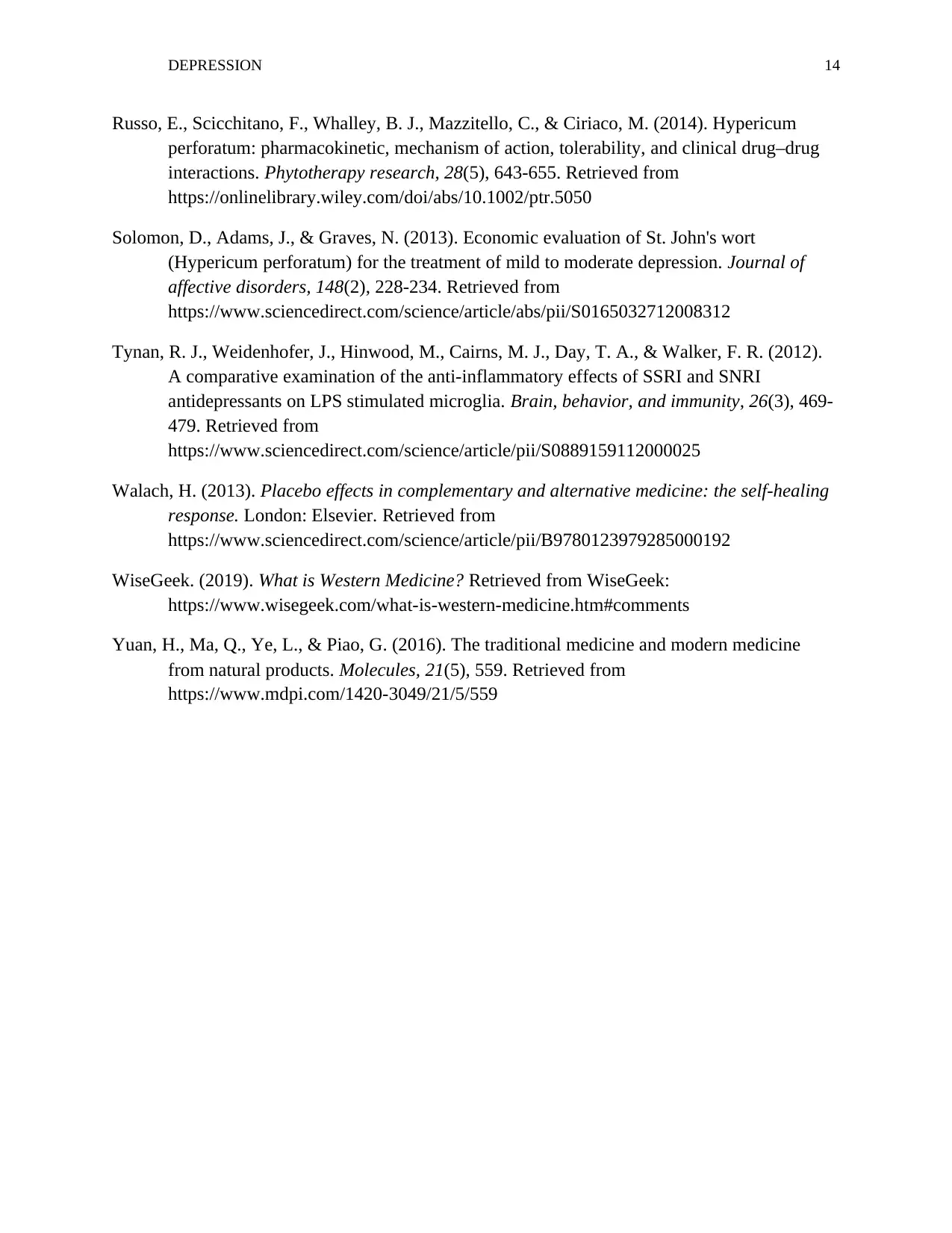
DEPRESSION 14
Russo, E., Scicchitano, F., Whalley, B. J., Mazzitello, C., & Ciriaco, M. (2014). Hypericum
perforatum: pharmacokinetic, mechanism of action, tolerability, and clinical drug–drug
interactions. Phytotherapy research, 28(5), 643-655. Retrieved from
https://onlinelibrary.wiley.com/doi/abs/10.1002/ptr.5050
Solomon, D., Adams, J., & Graves, N. (2013). Economic evaluation of St. John's wort
(Hypericum perforatum) for the treatment of mild to moderate depression. Journal of
affective disorders, 148(2), 228-234. Retrieved from
https://www.sciencedirect.com/science/article/abs/pii/S0165032712008312
Tynan, R. J., Weidenhofer, J., Hinwood, M., Cairns, M. J., Day, T. A., & Walker, F. R. (2012).
A comparative examination of the anti-inflammatory effects of SSRI and SNRI
antidepressants on LPS stimulated microglia. Brain, behavior, and immunity, 26(3), 469-
479. Retrieved from
https://www.sciencedirect.com/science/article/pii/S0889159112000025
Walach, H. (2013). Placebo effects in complementary and alternative medicine: the self-healing
response. London: Elsevier. Retrieved from
https://www.sciencedirect.com/science/article/pii/B9780123979285000192
WiseGeek. (2019). What is Western Medicine? Retrieved from WiseGeek:
https://www.wisegeek.com/what-is-western-medicine.htm#comments
Yuan, H., Ma, Q., Ye, L., & Piao, G. (2016). The traditional medicine and modern medicine
from natural products. Molecules, 21(5), 559. Retrieved from
https://www.mdpi.com/1420-3049/21/5/559
Russo, E., Scicchitano, F., Whalley, B. J., Mazzitello, C., & Ciriaco, M. (2014). Hypericum
perforatum: pharmacokinetic, mechanism of action, tolerability, and clinical drug–drug
interactions. Phytotherapy research, 28(5), 643-655. Retrieved from
https://onlinelibrary.wiley.com/doi/abs/10.1002/ptr.5050
Solomon, D., Adams, J., & Graves, N. (2013). Economic evaluation of St. John's wort
(Hypericum perforatum) for the treatment of mild to moderate depression. Journal of
affective disorders, 148(2), 228-234. Retrieved from
https://www.sciencedirect.com/science/article/abs/pii/S0165032712008312
Tynan, R. J., Weidenhofer, J., Hinwood, M., Cairns, M. J., Day, T. A., & Walker, F. R. (2012).
A comparative examination of the anti-inflammatory effects of SSRI and SNRI
antidepressants on LPS stimulated microglia. Brain, behavior, and immunity, 26(3), 469-
479. Retrieved from
https://www.sciencedirect.com/science/article/pii/S0889159112000025
Walach, H. (2013). Placebo effects in complementary and alternative medicine: the self-healing
response. London: Elsevier. Retrieved from
https://www.sciencedirect.com/science/article/pii/B9780123979285000192
WiseGeek. (2019). What is Western Medicine? Retrieved from WiseGeek:
https://www.wisegeek.com/what-is-western-medicine.htm#comments
Yuan, H., Ma, Q., Ye, L., & Piao, G. (2016). The traditional medicine and modern medicine
from natural products. Molecules, 21(5), 559. Retrieved from
https://www.mdpi.com/1420-3049/21/5/559
1 out of 14
Related Documents
Your All-in-One AI-Powered Toolkit for Academic Success.
+13062052269
info@desklib.com
Available 24*7 on WhatsApp / Email
![[object Object]](/_next/static/media/star-bottom.7253800d.svg)
Unlock your academic potential
© 2024 | Zucol Services PVT LTD | All rights reserved.




